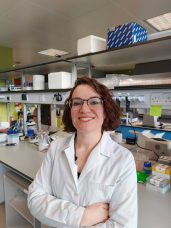Identification of ISG15 modified autophagy proteins and their potential as novel targets for oesophageal cancer (ISGAutoCan)

Dr Aranzazu Martínez de Marañón Peris
Oesophageal cancer frequently becomes resistant to chemotherapeutic drugs, resulting in treatment failure. This research is focused on understanding how this drug resistance happens so that we might improve patient outcomes.
The Autophagy Research Group previously found that a small molecule, called ISG15, was more highly expressed in sensitive cancer cells. The main purpose of this molecule is to bind to other proteins and change their function. ISG15 expression has been shown to block one of the mechanisms that cancer cells use to resist treatments, named autophagy. Autophagy, from the Greek auto (self) and phagy (eat), is a process by which cells digest their internal contents and recycle these as new building blocks. By engaging autophagy, cells can overcome several stresses including chemotherapy. In addition, cancer cells can use specialised autophagy of mitochondria (mitophagy) to redirect their metabolism.
Aranzazu is investigating how ISG15 can affect autophagy and mitophagy in response to chemotherapy treatments. The aim of the project is to understand how to modify the activity of ISG15 to prevent chemoresistance and improve the treatment of oesophageal cancer.
Clinical Challenge being addressed: Identifying the resistance mechanisms that oesophageal cancer cells use overcome to chemotherapy so that we can modify these and improve treatment.
Aranzazu undertook her Ph.D. at the University Hospital Dr. Peset-FISABIO-University of Valencia. She was awarded a short-term EMBO fellowship to undertake research at the Veneto Institute of Molecular Medicine-University of Padova during this time. Her Ph.D. investigated alterations in autophagy and mitochondrial dynamics and how this affects lymphocyte function in patients with Type 2 diabetes. In 2022 Aranzazu was awarded a Marie Skłodowska-Curie Co-fund Action (MSCA) post-doctoral fellowship with DevelopMed number 945425, co-funded by Breakthrough Cancer Research.
‘Survival rates for oesophageal cancer remain unacceptably low 24%, or less than 1 in 4. This research project will give us a new understanding of how oesophageal cancer cells resist current treatments, setting the basis for the development of new treatment strategies to improve patient survival.’ – Dr Aranzazu Martínez de Marañón Peris
Back








 Contact
Contact